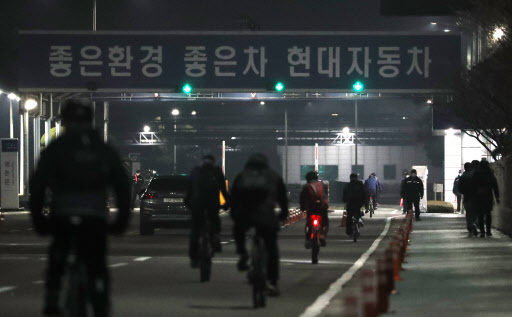Hyundai still lacking parts, full operation likely next week
By YonhapPublished : Feb. 19, 2020 - 11:47

Hyundai Motor Group said Wednesday its passenger car plants will fully recover next week following two weeks of partial operation as the spreading coronavirus disrupts the parts supply from China.
Hyundai Motor Co. and its affiliate Kia Motors Corp. said they plan to partially operate their passenger car plants by the end of this week as auto components from their suppliers in China are on their way to South Korea.
"For now, (Hyundai and Kia) expect all passenger vehicle assembly lines will be in full operation from Monday," a Hyundai spokesman said over the phone.
Hyundai and Kia, which together form the world's fifth-biggest carmaker by sales, had expected to resume all of their plants later this week thanks to the on-time supply of parts from China.
The spokesman said full operation of their plants has been delayed by one week as it will take more time than expected to receive parts from China, which has been hit hard by the deadly virus called COVID-19.
Hyundai and Kia brought their production lines to a halt on Feb. 7 and kept them suspended through Feb. 10 as their suppliers in China suspended production during an extended Lunar New Year holiday from Jan. 24 to Feb. 9.
It was the first time that Hyundai had suspended all of its domestic plants since 1997, when the Asian financial crisis affected local manufacturers and Mando Corp. stopped supplying parts to the carmaker.
The two carmakers partially restarted production at their domestic plants on Feb. 11, mainly using alternative auto components shipped from Southeast Asia.
Hyundai said it will initially focus on the production of popular models -- including the flagship Palisade sport utility vehicle and the GV80 SUV sold under its independent Genesis brand -- to meet rising demand and for exports to the United States.
Hyundai has seven domestic plants -- five in Ulsan, one in Asan and one in Jeonju -- and 10 overseas plants -- four in China and one each in the United States, the Czech Republic, Turkey, Russia, India and Brazil. Their combined capacity reaches 5.5 million vehicles.
Kia has eight local plants -- two in Gwangmyeong, three in Hwaseong and three in Gwangju -- and seven overseas ones -- three in China and one each in the U.S., Slovakia, Mexico and India.
Their overall capacity is 3.84 million units.
Their plants in China began partial production last week after the extended Lunar New Year break. But their other overseas plants remain unaffected by the virus.
The Chinese authorities had called on manufacturers to stop operations until Feb. 9, a week after the end of the holiday, to keep the deadly virus from spreading further.
Three other local carmakers have all resumed operations as their Chinese suppliers began production last week.
SsangYong Motor resumed the operation of its sole plant in Pyeongtaek, about 70 kilometers south of Seoul, on Thursday following suspension from Feb. 4-12. Renault Samsung also began production at its sole plant in Busan, about 450 km south of Seoul, on Monday after a suspension from Feb. 11-14.
GM Korea, which had not been affected by the virus outbreak, halted some of its lines at its main Bupyeong plant in Incheon, just west of Seoul, from Monday to Tuesday. The halted production began on Wednesday.
Analysts said they expect the suspensions at the carmakers to have an impact on their earnings results for the January-March quarter if the suspension period lasts longer than two weeks.
The Ministry of Trade, Industry and Energy said it will take all necessary steps to minimize the economic fallout of the supply disruptions on local carmakers.
To tackle supply shortages, the ministry said it will seek to simplify import processing for auto parts from Vietnam, Cambodia and the Philippines; provide financial subsidies to local auto part makers, including loans for the expansion of production lines; and fund their research and development projects.
South Korea reported 15 new confirmed cases of the novel coronavirus on Wednesday, raising its total from 31 to 46. (Yonhap)








![[KH Explains] Hyundai's full hybrid edge to pay off amid slow transition to pure EVs](http://res.heraldm.com/phpwas/restmb_idxmake.php?idx=644&simg=/content/image/2024/04/18/20240418050645_0.jpg&u=20240419100350)







![[From the Scene] Monks, Buddhists hail return of remains of Buddhas](http://res.heraldm.com/phpwas/restmb_idxmake.php?idx=652&simg=/content/image/2024/04/19/20240419050617_0.jpg&u=20240419175937)

![[KH Explains] Hyundai's full hybrid edge to pay off amid slow transition to pure EVs](http://res.heraldm.com/phpwas/restmb_idxmake.php?idx=652&simg=/content/image/2024/04/18/20240418050645_0.jpg&u=20240419100350)

![[Today’s K-pop] Illit drops debut single remix](http://res.heraldm.com/phpwas/restmb_idxmake.php?idx=642&simg=/content/image/2024/04/19/20240419050612_0.jpg&u=)